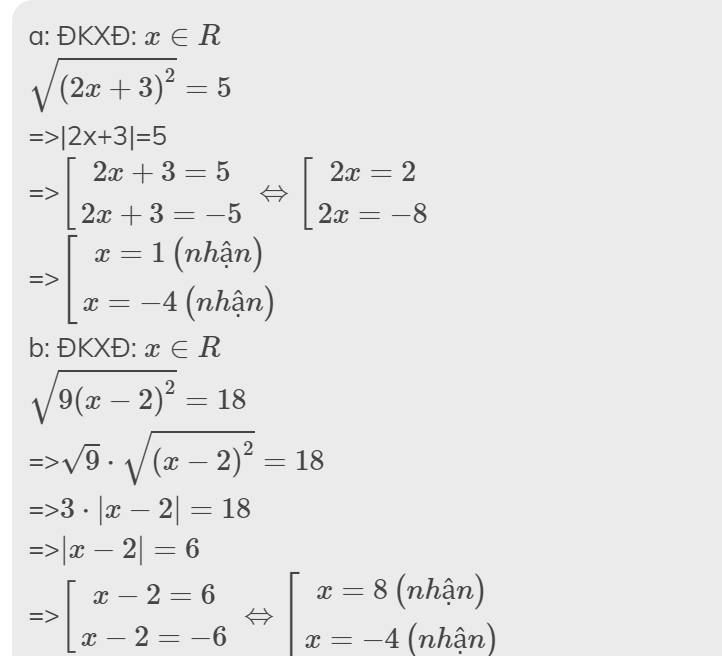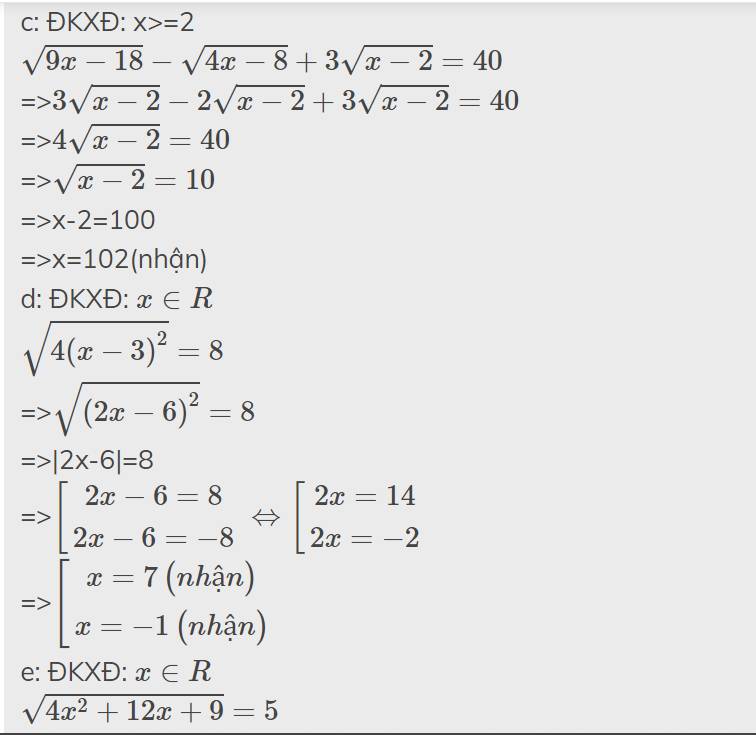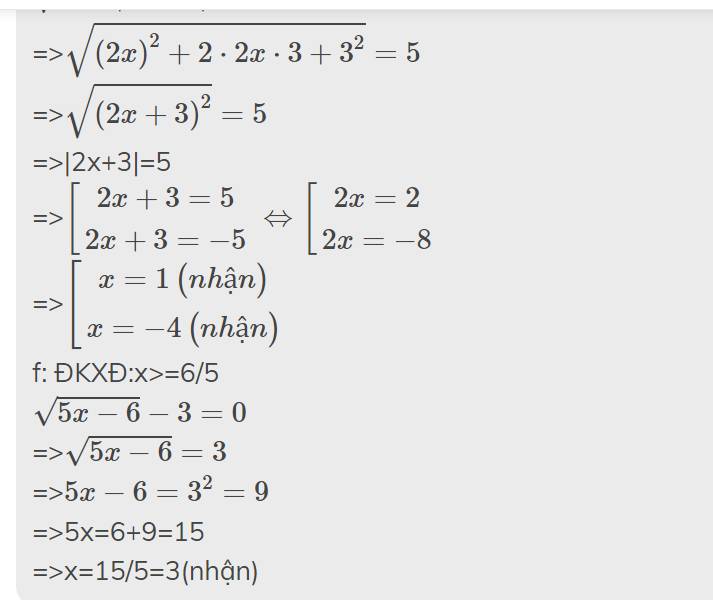Giaỉ phương trình sau: \(\sqrt{4x+1}-\sqrt{3-x}+4x^2-5x-8=0\)
Hãy nhập câu hỏi của bạn vào đây, nếu là tài khoản VIP, bạn sẽ được ưu tiên trả lời.


2:
a: =>2x^2-4x-2=x^2-x-2
=>x^2-3x=0
=>x=0(loại) hoặc x=3
b: =>(x+1)(x+4)<0
=>-4<x<-1
d: =>x^2-2x-7=-x^2+6x-4
=>2x^2-8x-3=0
=>\(x=\dfrac{4\pm\sqrt{22}}{2}\)

a: \(\Leftrightarrow\dfrac{1}{3}\sqrt{x-2}-\dfrac{2}{3}\cdot3\sqrt{x-2}+6\cdot\dfrac{\sqrt{x-2}}{9}=-4\)
\(\Leftrightarrow\sqrt{x-2}=4\)
=>x-2=16
hay x=18
b: \(\Leftrightarrow\left|3x+2\right|=4x\)
\(\Leftrightarrow\left[{}\begin{matrix}3x+2=4x\left(x>=-\dfrac{2}{3}\right)\\3x+2=-4x\left(x< -\dfrac{2}{3}\right)\end{matrix}\right.\Leftrightarrow\left[{}\begin{matrix}x=2\left(nhận\right)\\x=-\dfrac{2}{7}\left(nhận\right)\end{matrix}\right.\)
c: \(\Leftrightarrow3\sqrt{x-2}-2\sqrt{x-2}+3\sqrt{x-2}=40\)
\(\Leftrightarrow4\sqrt{x-2}=40\)
=>x-2=100
hay x=102
d: =>5x-6=9
hay x=3
\(\dfrac{1}{3}\sqrt{x-2}-\dfrac{2}{3}\sqrt{9x-18}+6\sqrt{\dfrac{x-2}{81}}=-4\) (đk: x≥2)
\(\dfrac{1}{3}\sqrt{x-2}-\dfrac{2}{3}\sqrt{9\left(x-2\right)}+6\sqrt{\dfrac{1}{81}\left(x-2\right)}=-4\)
\(\dfrac{1}{3}\sqrt{x-2}-2\sqrt{x-2}+\dfrac{2}{3}\sqrt{x-2}=-4\)
\(\dfrac{1}{3}\sqrt{x-2}-\dfrac{4}{3}\sqrt{x-2}=-4\)
\(-\sqrt{x-2}=-4\)
\(\sqrt{x-2}=4\)
\(\left|x-2\right|=16\)
\(\Leftrightarrow\left[{}\begin{matrix}x-2=16\\x-2=-16\end{matrix}\right.\Leftrightarrow\left[{}\begin{matrix}x=18\left(TM\right)\\x=-14\left(L\right)\end{matrix}\right.\)

a: Ta có: \(\sqrt{x^2-x+3}+7=10\)
\(\Leftrightarrow x\left(x-1\right)=0\)
\(\Leftrightarrow\left[{}\begin{matrix}x=0\\x=1\end{matrix}\right.\)
b: Ta có: \(\sqrt{x^2-4x+8}-7=-5\)
\(\Leftrightarrow x^2-4x+8=4\)
\(\Leftrightarrow x-2=0\)
hay x=2

Gợi ý
ĐKXĐ: ....
Do x=0 không phải là nghiệm nên chia cả hai vế cho x^2 có
\(\sqrt{2+\frac{5}{x}+\frac{3}{x^2}}=4-\frac{5}{x}-\frac{3}{x^2}\)(1) Đặt \(\sqrt{\frac{5}{x}+\frac{3}{x^2}+2}=y\Rightarrow y\ge0\)và \(\frac{5}{x}+\frac{3}{x^2}=y^2-2\)
Khi đó \(\left(1\right)\Leftrightarrow y=4-y^2+2\)Sau khi tìm được y thì thế vào tìm x , rồi đối chiếu ĐKXĐ và trả lời
KL : ...

a: Ta có: \(\sqrt{4x^2+4x+3}=8\)
\(\Leftrightarrow4x^2+4x+1+2-64=0\)
\(\Leftrightarrow4x^2+4x-61=0\)
\(\Delta=4^2-4\cdot4\cdot\left(-61\right)=992\)
Vì Δ>0 nên phương trình có hai nghiệm phân biệt là:
\(\left\{{}\begin{matrix}x_1=\dfrac{-4-4\sqrt{62}}{8}=\dfrac{-1-\sqrt{62}}{2}\\x_2=\dfrac{-4+4\sqrt{62}}{8}=\dfrac{-1+\sqrt{62}}{2}\end{matrix}\right.\)

\(a,PT\Leftrightarrow\left|x+3\right|=3x-6\\ \Leftrightarrow\left[{}\begin{matrix}x+3=3x-6\left(x\ge-3\right)\\x+3=6-3x\left(x< -3\right)\end{matrix}\right.\Leftrightarrow\left[{}\begin{matrix}x=\dfrac{9}{2}\left(tm\right)\\x=\dfrac{3}{4}\left(ktm\right)\end{matrix}\right.\\ \Leftrightarrow x=\dfrac{9}{2}\\ b,PT\Leftrightarrow\left|x-1\right|=\left|2x-1\right|\\ \Leftrightarrow\left[{}\begin{matrix}x-1=2x-1\\1-x=2x-1\end{matrix}\right.\Leftrightarrow\left[{}\begin{matrix}x=0\\x=\dfrac{2}{3}\end{matrix}\right.\)
\(c,ĐK:x\le\dfrac{2}{5}\\ PT\Leftrightarrow4-5x=25x^2-20x+4\\ \Leftrightarrow25x^2-15x=0\\ \Leftrightarrow5x\left(5x-3\right)=0\\ \Leftrightarrow\left[{}\begin{matrix}x=0\left(tm\right)\\x=\dfrac{3}{5}\left(ktm\right)\end{matrix}\right.\Leftrightarrow x=0\\ d,ĐK:x\le\dfrac{2}{5}\\ PT\Leftrightarrow4-5x=2-5x\\ \Leftrightarrow x\in\varnothing\)

\(a,ĐK:\left\{{}\begin{matrix}x\ge5\\x\le3\end{matrix}\right.\Leftrightarrow x\in\varnothing\)
Vậy pt vô nghiệm
\(b,ĐK:x\le\dfrac{2}{5}\\ PT\Leftrightarrow4-5x=2-5x\\ \Leftrightarrow0x=2\Leftrightarrow x\in\varnothing\)
\(c,ĐK:x\ge-\dfrac{3}{2}\\ PT\Leftrightarrow x^2+4x+5-2\sqrt{2x+3}=0\\ \Leftrightarrow\left(2x+3-2\sqrt{2x+3}+1\right)+\left(x^2+2x+1\right)=0\\ \Leftrightarrow\left(\sqrt{2x+3}-1\right)^2+\left(x+1\right)^2=0\\ \Leftrightarrow\left\{{}\begin{matrix}2x+3=1\\x+1=0\end{matrix}\right.\Leftrightarrow\left\{{}\begin{matrix}x=-1\\x=-1\end{matrix}\right.\Leftrightarrow x=-1\left(tm\right)\\ d,PT\Leftrightarrow\left|x-1\right|=\left|2x-1\right|\Leftrightarrow\left[{}\begin{matrix}x-1=2x-1\\x-1=1-2x\end{matrix}\right.\Leftrightarrow\left[{}\begin{matrix}x=0\\x=\dfrac{2}{3}\end{matrix}\right.\)



ĐKXĐ: \(-\dfrac{1}{4}\le x\le3\)
\(\left(\sqrt{4x+1}-3\right)+\left(1-\sqrt{3-x}\right)+\left(4x^2-5x-6\right)=0\)
\(\Leftrightarrow\dfrac{4\left(x-2\right)}{\sqrt{4x+1}+3}+\dfrac{x-2}{1+\sqrt{3-x}}+\left(x-2\right)\left(4x+3\right)=0\)
\(\Leftrightarrow\left(x-2\right)\left(\dfrac{4}{\sqrt{4x+1}+3}+\dfrac{1}{1+\sqrt{3-x}}+4x+3\right)=0\)
Do \(\dfrac{4}{\sqrt{4x+1}+3}+\dfrac{1}{1+\sqrt{3-x}}+4x+3>0;\forall x\in\left[-\dfrac{1}{4};3\right]\)
\(\Rightarrow x-2=0\Rightarrow x=2\)